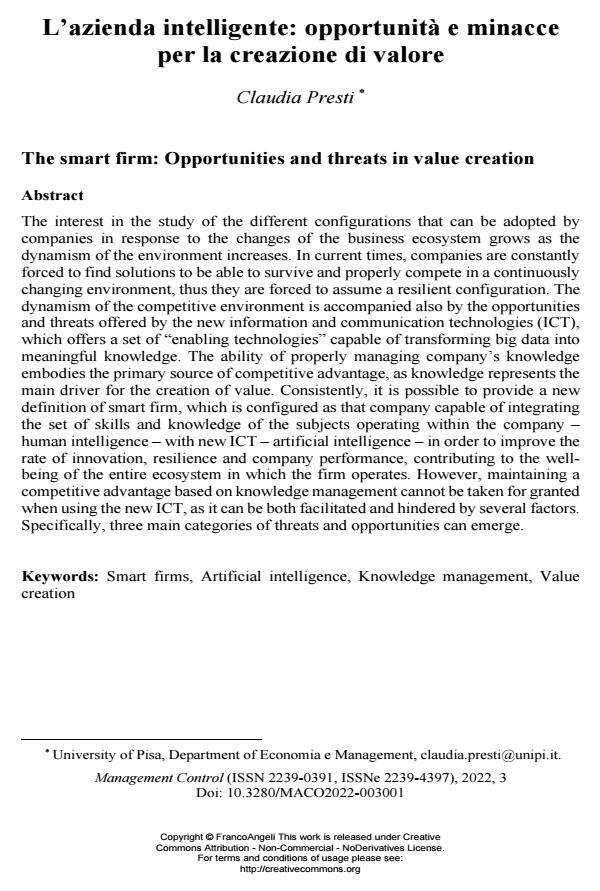The smart firm: Opportunities and threats in value creation
Journal title MANAGEMENT CONTROL
Author/s Claudia Presti
Publishing Year 2022 Issue 2022/3
Language Italian Pages 8 P. 5-12 File size 247 KB
DOI 10.3280/MACO2022-003001
DOI is like a bar code for intellectual property: to have more infomation
click here

FrancoAngeli is member of Publishers International Linking Association, Inc (PILA), a not-for-profit association which run the CrossRef service enabling links to and from online scholarly content.
The interest in the study of the different configurations that can be adopted by companies in response to the changes of the business ecosystem grows as the dynamism of the environment increases. In current times, companies are constantly forced to find solutions to be able to survive and properly compete in a continuously changing environment, thus they are forced to assume a resilient configuration. The dynamism of the competitive environment is accompanied also by the opportunities and threats offered by the new information and communication technologies (ICT), which offers a set of "enabling technologies" capable of transforming big data into meaningful knowledge. The ability of properly managing company’s knowledge embodies the primary source of competitive advantage, as knowledge represents the main driver for the creation of value. Consistently, it is possible to provide a new definition of smart firm, which is configured as that company capable of integrating the set of skills and knowledge of the subjects operating within the company - human intelligence - with new ICT - artificial intelligence - in order to improve the rate of innovation, resilience and company performance, contributing to the well-being of the entire ecosystem in which the firm operates. However, maintaining a competitive advantage based on knowledge management cannot be taken for granted when using the new ICT, as it can be both facilitated and hindered by several factors. Specifically, three main categories of threats and opportunities can emerge.
Keywords: Smart firms, Artificial intelligence, Knowledge management, Value creation
- Value co-creation via machine learning from a configuration theory perspective Claudia Presti, Federica De Santis, Francesca Bernini, in European Journal of Innovation Management /2023 pp.449
DOI: 10.1108/EJIM-01-2023-0104 - La misurazione dell'impatto della digitalizzazione sulla performance delle organizzazioni di Long-Term Care. Una revisione sistematica della letteratura Gabriele Palozzi, Marco Di Martino, Antonio Chirico, Gianluca Antonucci, in MANAGEMENT CONTROL 3/2026 pp.111
DOI: 10.3280/MACO2025-003006 - Il contributo di Management Control alla ricerca su tecnologie digitali e sostenibilità Daniela Mancini, Domenica Lavorato, Palmira Piedepalumbo, in MANAGEMENT CONTROL 2/2023 pp.5
DOI: 10.3280/MACO2023-002001 - Art, Culture and Made in Italy Palmira Piedepalumbo, pp.315 (ISBN:978-3-032-12527-9)
- Dalla misurazione dell'outcome a quella dell'impact: la Sentiment Analysis a supporto della valutazione della performance delle aziende sanitarie pubbliche Christian Di Falco, Guido Noto, Gustavo Barresi, in MANAGEMENT CONTROL 2/2025 pp.157
DOI: 10.3280/MACO2025-002008 - I Big Data non "parlano da soli". Il ruolo dei modelli nella diffusione degli analytics per il management accounting Roberto Del Gobbo, in MANAGEMENT CONTROL 1/2023 pp.5
DOI: 10.3280/MACO2023-001001 - The impact of digitalisation on professional football clubs Fabio Nappo, Alessandra Lardo, Maria Teresa Bianchi, Federico Schimperna, in MANAGEMENT CONTROL 2/2023 pp.117
DOI: 10.3280/MACO2023-002006 - I "pacchetti" di controllo manageriale nei team virtuali Guido Noto, Carmelo Marisca, Gustavo Barresi, in MANAGEMENT CONTROL 3/2024 pp.43
DOI: 10.3280/MACO2023-003003
Claudia Presti, L’azienda intelligente: opportunità e minacce per la creazione di valore in "MANAGEMENT CONTROL" 3/2022, pp 5-12, DOI: 10.3280/MACO2022-003001